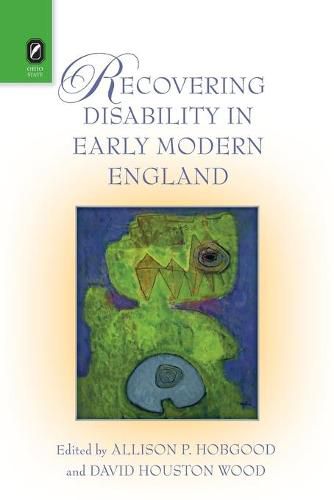Readings Newsletter
Become a Readings Member to make your shopping experience even easier.
Sign in or sign up for free!
You’re not far away from qualifying for FREE standard shipping within Australia
You’ve qualified for FREE standard shipping within Australia
The cart is loading…






This title is printed to order. This book may have been self-published. If so, we cannot guarantee the quality of the content. In the main most books will have gone through the editing process however some may not. We therefore suggest that you be aware of this before ordering this book. If in doubt check either the author or publisher’s details as we are unable to accept any returns unless they are faulty. Please contact us if you have any questions.
While early modern selfhood has been explored during the last two decades via a series of historical identity studies involving class, race and ethnicity, and gender and sexuality, until very recently there has been little engagement with disability and disabled selves in sixteenth- and seventeenth-century England. This omission is especially problematic insofar as representations of disabled bodies and minds serve as some of the signature features in English Renaissance texts. Recovering Disability in Early Modern England explores how recent conversations about difference in the period have either overlooked or misidentified disability representations. It also presents early modern disability studies as a new theoretical lens that can reanimate scholarly dialogue about human variation and early modern subjectivities even as it motivates more politically invested classroom pedagogies. The ten essays in this collection range across genre, scope, and time, including examinations of real-life court dwarfs and dwarf narrators in Edmund Spenser’s poetry; disability in Aphra Behn’s assessment of gender and femininity; disability humor, Renaissance jest books, and cultural ideas about difference; madness in revenge tragedies; Spenserian allegory and impairment; the materiality of literary blindness; feigned disability in Jonsonian drama; political appropriation of Richard III in the postcommunist Czech Republic; the Book of Common Prayeras textual accommodation for cognitive disability; and Thomas Hobbes’s and John Locke’s inherently ableist conceptions of freedom and political citizenship.
$9.00 standard shipping within Australia
FREE standard shipping within Australia for orders over $100.00
Express & International shipping calculated at checkout
This title is printed to order. This book may have been self-published. If so, we cannot guarantee the quality of the content. In the main most books will have gone through the editing process however some may not. We therefore suggest that you be aware of this before ordering this book. If in doubt check either the author or publisher’s details as we are unable to accept any returns unless they are faulty. Please contact us if you have any questions.
While early modern selfhood has been explored during the last two decades via a series of historical identity studies involving class, race and ethnicity, and gender and sexuality, until very recently there has been little engagement with disability and disabled selves in sixteenth- and seventeenth-century England. This omission is especially problematic insofar as representations of disabled bodies and minds serve as some of the signature features in English Renaissance texts. Recovering Disability in Early Modern England explores how recent conversations about difference in the period have either overlooked or misidentified disability representations. It also presents early modern disability studies as a new theoretical lens that can reanimate scholarly dialogue about human variation and early modern subjectivities even as it motivates more politically invested classroom pedagogies. The ten essays in this collection range across genre, scope, and time, including examinations of real-life court dwarfs and dwarf narrators in Edmund Spenser’s poetry; disability in Aphra Behn’s assessment of gender and femininity; disability humor, Renaissance jest books, and cultural ideas about difference; madness in revenge tragedies; Spenserian allegory and impairment; the materiality of literary blindness; feigned disability in Jonsonian drama; political appropriation of Richard III in the postcommunist Czech Republic; the Book of Common Prayeras textual accommodation for cognitive disability; and Thomas Hobbes’s and John Locke’s inherently ableist conceptions of freedom and political citizenship.